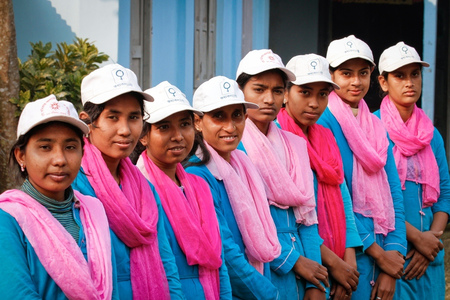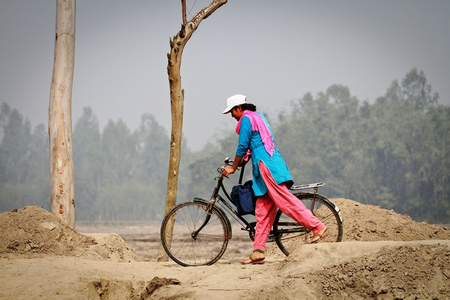Bangladesh’s Female Bike Brigade Brings Internet Access to Citizens
Lalmai Begum is a housewife in Sughatta, a small village in Bangladesh's Gaibandha District. Sughatta is located over 180 miles away from the nation’s capital Dhaka, home to most of the developing country’s IT, medical, and educational services. Driving to Sughatta from the nearest interstate highway takes over two hours. The village has, for years, remained sheltered from the outside world. Most of Sughatta’s inhabitants are farmers, and there are few doctors in the village, making it difficult for the village’s inhabitants to secure medical treatment when they are in desperate need of it.
When Begum and her young daughter found themselves getting increasingly sick with maladies they couldn’t treat themselves, they enlisted the help of Info Ladies. Thanks to Bangladesh’s Info Ladies, Begum and her daughter were able to gain an Internet connection and speak to a medical help desk in Dhaka, after which Begum was able to acquire the necessary medications that would remedy them.

The Infoladies, via Amirul Rajiv.
Bangladesh’s Info Ladies, a group of 56 women in their early 20s, travel on bikes across the country to help men and women like Begum who can’t afford or access a fortified, reliable Internet connection. Employed by Bangladeshi ICT4D advocacy NGO D.Net (Development Reserach Network) since 2008, these Info Ladies are ready to aid and assist villagers in a variety of tasks. The women have matching uniforms – a pink-and-blue salwar kameez – and, one by one, bike from village to village to aid impoverished villagers.
They’re equipped with laptops, tablets, smartphones, digital cameras, glucometers, shampoo bottles, pregnancy tests, and cosmetics. They can offer cameras to villagers so they can take wedding photos. Some offer blood sugar readings to diabetes patients. Farmers desperate for better techniques for harvesting their crops can enlist the help of Info Ladies, who will scour search engines for farming techniques. Women whose husbands are working as contractors in the Middle East can Skype their loved ones, allowing them to stay close to their families.

An Infolady, via Amirul Rajiv.
The idea for the Info Lady campaign began in 2008, when the Info Lady was the Mobile Lady. D.Net imagined that Bangladesh’s citizens could find solutions to some of their most pressing day-to-day problems – from good farming practices to medication recommendations – by having access to mobile phones. Offering a three-month training session for the women, D.Net taught them how to use their devices. The positions are salaried at roughly $90 per month, substantially more than how much Bangladeshi farmers earn per month.
The Info Ladies project is one of the most publicly visible ways in which Bangladesh’s media freedom advocates are trying to foster a networked culture of Internet access. An alarmingly small portion of Bangladesh enjoys Internet access – some estimates pin it down at 3%, others at 6% – and roughly three-quarters of the country’s population lives in rural impoverished villages. The World Economic Forum 2013 ranked Bangladesh 114 out of 144 countries worldwide in terms of Internet infrastructure. The Info Ladies program is not an unequivocal success – some socially conservative regions of Bangladesh don’t react well to the idea of women in employment, while others still view new media with intense skepticism, casting it as alien and unwanted. Nevertheless, for a nation that has struggled developmentally to establish reliable and secure Internet connectivity, Bangladesh’s Info Ladies are making basic Internet access a reality for many people who previously were unable to enjoy it.